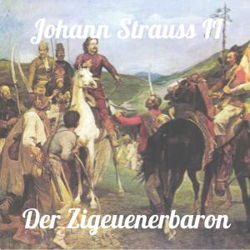
Sándor Barinkay has returned home to his family estate after spending his life working as an animal trainer in a performing troop. While dealing with the paperwork with Count Carnero, Barinkay finds that a lot has been going on in his absence; gypsies have moved onto his land, and the local pig farmer, Zsupan, has expanded his enterprises there as well. Barinkay wants an easy life, so he offers to marry Zsupan’s daughter Arsena in exchange for them using the land. Arsena has other ideas, as she is already in love with Ottokar, the son of her governess, Mirabella (and, as it turns out, Count Carnero).
When the gypsy fortune-teller, Czipra, announces that Barinkay is their foretold leader, he is proclaimed ‘Der Zigeuenerbaron’ , ‘The Gypsy Baron’. With this new title, he offers again to marry Arsena, and is rejected again. Concerned with having a wife and finally settling down, he then chooses Saffi, Czipras’ daughter. The two fall in love, and vow their marriage to nature and the sky. Unfortunately, that is not official enough for Count Carnero, and he requests that the legal requirements be fulfilled. Another revelation from Czipra makes this impossible: Saffi is actually a princess, and the daughter of a Turkish Pasha. She is too far above Barinkay’s station for him to marry her.
Barinkay gives up and joins the army to fight the war in Spain, along with several other men who are swept up by the recruiting troops that pass through the town. Several years later, the men are celebrating a great victory in the war. For his bravery, Barinkay is rewarded with a title, and can finally marry Saffi.
Strauss’s Der Zigeunerbaron is a true gem of operetta, with music of the quality found in his earlier work Die Fledermaus, and a wonderful array of exotic characters getting themselves into hilarious situations.
Der Zigeunerbaron guide sections